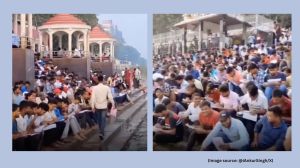The great hurdle race for school
Too many children, too few good schools: the crisis in school admissions is looming large

In cities all over the country, getting one’s child into a good school is becoming one of the toughest hurdles for parents today. Take Delhi, for instance. The Delhi High Court banned admissions based on interviews with parents and children and has directed schools to come up with alternative admission procedures. A final verdict on the issue is expected shortly.
The fact is that there just aren’t enough schools. Good private schools in Delhi get an astounding 1,800 applications for just 100-odd seats. In fact, given this situation, the interview system is still the best way to choose candidates. At least it gives the child of an ordinary person a fighting chance to get in. Without interviews, even these 100 seats will vanish. The whole process will become more opaque and, probably, more corrupt. While it makes no sense for school authorities to interview toddlers, meeting up with parents to gauge if their aspirations match that of the school would appear valid. There can, of course, be guidelines on how such interviews should be conducted so that intrusive questioning is avoided.
In the wake of the court ban, the criteria being considered for selecting students are getting dodgy. Some argue in favour of neighbourhood schools. But in a city like Delhi schools are not evenly spread out. There may be over 21 schools between Vasant Vihar and Vasant Kunj and not one in Shalimar Bagh or South Extension. As for selection on a first-come-first-served basis, or even random selection, they can lead to riot-like scenarios. In one school last year people jumped over walls to get ahead in the queue. To make elimination easier, one school plans to give preference to single parents, adopted children, alumni’s kids and siblings. Another school prefers stay-at-home moms. One school’s application process is strictly online. Some educationists are working on more innovative solutions: they plan to keep a secret watch on the demeanour of parents, right from the point they enter the school and make a judgment on the basis of their observations.
Some of these procedures border on the absurd. The world over, private schools reserve the right to choose their students. In the US and UK, they conduct lengthy interviews with parents. In any case state-run schools here are run so well that only 11 per cent of students in the US, for instance, opt for private schools. The situation is totally different here. Although Delhi has over a thousand government schools and another 900 corporation schools, they are not attractive options, lacking in even basic facilities like drinking water.
Of course there can be no doubt that private schools need stricter monitoring. While some are known to sell seats to the highest bidder, others adopt an inexplicable aversion to the children of small businessmen. Many actually harass parents and impose levies arbitrarily. But, ultimately, the situation will improve only if more good schools are instituted. Until that happens, school admissions will continue to be every parent’s worst nightmare.



- 01
- 02
- 03
- 04
- 05




























